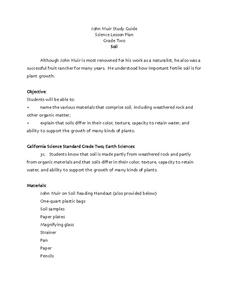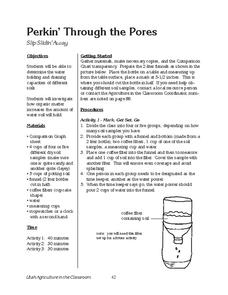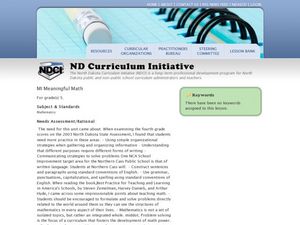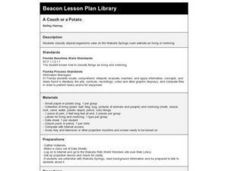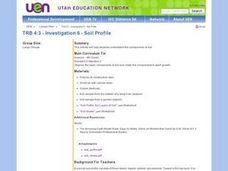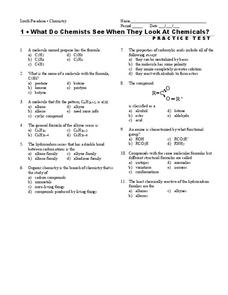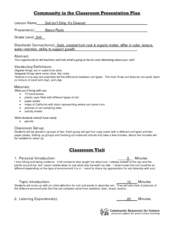Curated OER
SORTING ALL SORTS
Students examine how the method of classification is used. In this sorting lesson students take a pre-test, classify organisms and complete a crossword puzzle.
Curated OER
The Cream of the Crop
Students read and discuss article, "Simple Method Found to Vastly Increase Crop Yields," then research the basic components of conventional and organic agricultural methods. They, in groups, organize and present their research to the class.
Curated OER
The Human Body Lesson
Students identify features of the human body, explore needs of the human body by explaining the importance of good health in relationship to the body, and study functions and care of the human body and its organs.
Curated OER
Pandemics and Epidemics
Students evaluate data related to population growth, along with problems and soultions: disease cvontrol. They are able to explain how changes in habitat may affect organisms. Students evaluate evolutionary theories and processes.
Curated OER
Coral Reefs
Students research an inhabitant of a Caribbean coral reef using a list of common organisms that live on or near it. Students then write a description of their organism and draw a picture or a 3-D model of it. Eventually they all work...
Curated OER
Soil
Second graders name the various materials that comprise soil, including weathered rock and other organic matter. They explain that soils differ in their color, texture, capacity to retain water, and ability to support the growth of many...
Curated OER
Perkin' Through the Pores
Young scholars investigate how organic matter increases the amount of water soil will hold. In this water soil lesson plan, students use soil and measure water amounts using organic matter. Young scholars measure the water holding...
Curated OER
MI Meaningful Math
Fifth graders increase skills in organizing information for writing. In this organization lesson, 5th graders use correct grammar to design math problems for real world math.
Curated OER
The Barn Owl Pellet
Seventh graders examine the factors that affect the number and types of organisms that an ecosystem can support. In this ecosystem lesson students study the barn owl and where it is on the food chain, then dissect an owl pellet.
Curated OER
A Couch or a Potato
Learners classify objects and organisms seen on the Wakulla Springs icam website as living or nonliving.
Curated OER
Marine & Aquatic Habitats Activities - Tidal Pools
Middle schoolers analyze the survival needs of different organisms and the conditions in a particular area that can affect these survival rates.
Curated OER
Introducing the Use of Dichotomous Keys to Students
Students are introduced to the use of dichotomous keys as a simple means of beginning scientific observations in nature. They comprehend how to use a dichotomous key. Students distinguish characteristics of a group of organisms. They...
Curated OER
Gene Puzzles
Young scholars come to understand that in sexually reproducing organisms, such as humans, typically half of the genes come from each parent.
Students examine a fictional pedigree and determine which gene is responsible for a given trait....
Curated OER
Investigation 6 - Soil Profile
Fourth graders study the components of soil. They observe the basic components of soil and relate the components to plant growth. They record color, texture, and kinds of materials on their profile log (light color, denser, grittier -...
Curated OER
Funky Fungus
Students discuss decomposition, bacteria, fungi and other microscopic organisms. They participate in an experiment to grow fungus on bread. As the fungus colonies grow, students observe them under a microscope to identify and locate...
Curated OER
How Do Single-Celled Organisms Live?
For this single-celled organisms worksheet, students write in how an amoeba, paramecium, and euglena move. Based on these facts, students come to a conclusion about how these organisms live. This worksheet has 4 short answer questions.
Curated OER
Life Processes
Students identify life processes and create their own creature. In this creative science lesson, students identify an organism's life processes and categorize them into groups. They then create their own creature and write about how it...
Curated OER
Hydrocarbons
In this hydrocarbon worksheet, students answer 13 questions about different types of organic molecules categorized as hydrocarbons. They explain the different hydrocarbons, they draw structural diagrams for different hydrocarbons and...
Curated OER
What do Chemists See When they Look at Chemicals?
In this chemicals worksheet, students answer 15 multiple choice questions about chemicals, compounds, inorganic and organic molecules.
Curated OER
Species Interactions in the Yucatan Peninsula
Sixth graders explore how organisms interact with one another other in their environment. In this organism lesson, 6th graders understand abiotic factors and or biotic components of their environment. Students decide if the interactions...
Curated OER
Soil Isn't Dirty; It's Diverse!
Second graders participate in a soil activity. In this soil instructional activity students complete a worksheet describing different soil types and the organic and inorganic things found in them.
Curated OER
It's Time to Get Organ-Wised
Students engage in a lesson which contains several ideas for a unit on the body and body organs. They solve riddles, color in shapes of organs, participate in games and read about the functions of the various organs. Worksheets are...
Curated OER
Nonprofit Organizations in Our Community: Interviewing Representatives
Students interview representatives from nonprofit organizations. In this philanthropy lesson, students prepare questions for a representative from a nonprofit organization. After conducting the interview, they are to prepare a short...
Curated OER
Ladder -- Graphic Organizer
In this language arts worksheet, students use this ladder graphic organizer to prepare for writing. Students list the topic at the top and the details on the writing lines below. The lines are appropriate for primary students.
Other popular searches
- Classifying Organisms
- Classification of Organisms
- Basic Needs of Organisms
- Aerobic Organisms
- Extinct Organisms
- Genetically Modified Organisms
- Freshwater Organisms
- Relationships Among Organisms
- Interdependence Organisms
- Extinction of Organisms
- Multicellular Organisms
- Organisms Interact







